Come Away 07/21/2024 “He began to teach them many things.”
Repent and Believe 07/14/2024 “Jesus summoned the Twelve and began to send them out two by two.”
As Enthusiasm Becomes Disillusionment 07/07/2024 “A prophet is not without honor except in his native place and among his own kin and in his own house.”
Whom Do You Trust? 06/30/2024 “He took the child by the hand and said to her, ‘Talitha koum,’ which means, ‘Little girl, I say to you, arise!’”
Conqueror of Sea and Storm 06/23/2024 “Who then is this whom even wind and sea obey?”
Receiving the Seed of Faith 06/16/2024 “But once it is sown, it springs up and becomes the largest of plants and puts forth large branches, so that the birds of the sky can dwell in its shade.”
Homecoming 06/09/2024 “Here are my mother and my brothers. For whoever does the will of God is my brother and sister and mother.”
Life Is in the Blood 06/02/2024 “When Christ came as high priest … passing through the greater and more perfect tabernacle … he entered once for all into the sanctuary …”
The Living Power of Love 05/26/2024 “Go, therefore, and make disciples of all nations, baptizing them in the name of the Father, and of the Son, and of the Holy Spirit.”
Breaking the Fourth Wall 05/19/2024 “Receive the Holy Spirit. Whose sins you forgive are forgiven them, and whose sins you retain are retained”
Witness to the Ascension 05/12/2024 “So then the Lord Jesus, after he spoke to them, was taken up into heaven and took his seat at the right hand of God.”
Remain in My Love 05/05/2024 “This is my commandment: love one another as I love you.”
Grace and Judgment 04/28/2024 “I am the vine, you are the branches. Whoever remains in me and I in them will bear much fruit.”
Mine Know Me 04/21/2024 “I am the good shepherd, and I know mine and mine know me …”
Kairos: the Critical Moment 04/14/2024 “Look at my hands and my feet, that it is I myself.”
As the Father Has Sent Me … 04/07/2024 “’Have you come to believe because you have seen me? Blessed are those who have not seen and have believed.”
We Are an Easter People 03/31/2024 “For they did not yet understand the Scripture that he had to rise from the dead.”
Beyond Expectations 03/31/2024 “He has been raised. He is not here.”
Service as Eucharist 03/29/2024 “It is finished.”
Selfless Eucharist 03/28/2024 “I have given you a model to follow, so that as I have done for you, you should also do.”
What Are You Looking For? 03/24/2024 Palm Sunday Scripture Readings God and humankind seem always to be at cross-purposes. God is forever reaching out to show himself to us, to tell us about himself, and to lift us up out of…
Read more: What Are You Looking For? When We Are Lifted Up 03/17/2024 “The hour has come for the Son of Man to be glorified.”
Doing the Truth 03/10/2024 “Just as Moses lifted up the serpent in the desert, so must the Son of Man be lifted up, so that everyone who believes in him may have eternal life.”
Cleansing the Temple 03/03/2024 “Take these out of here, and stop making my Father’s house a marketplace.”
Beyond the Bible 02/25/2024 “This is my beloved Son. Listen to him.”
Temptation Reimagined 02/18/2024 “He was among wild beasts, and the angels ministered to him.”
A Recipe for Repentance 02/14/2024 “Take care not to perform righteous deeds in order that people may see them.”
To Pray as We Ought 02/11/2024 “‘I do will it. Be made clean.’ The leprosy left him immediately, and he was made clean.”
The Disciples’ Transformation 02/04/2024 “He approached, grasped her hand, and helped her up. Then the fever left her and she waited on them.”
The Human Dilemma 01/28/2024 “I know who you are—the Holy One of God!”
Detachment from Fear 01/21/2024 “Come after me, and I will make you fishers of men.”
Steps to Discipleship 01/14/2024 Second Sunday Scripture Readings Today, we begin to follow the ministry of Jesus—a ministry that commenced when his true identity was revealed at his baptism by John in the Jordan River. In a short while,…
Read more: Steps to Discipleship We Have Seen His Star 01/07/2024 “They were overjoyed at seeing the star, and on entering the house they saw the child with Mary his mother.”
Becoming the God-Bearer 01/01/2024 “And Mary kept all these things, reflecting on them in her heart.”
Dimensions of Spirituality 12/31/2023 “The child grew and became strong, filled with wisdom; and the favor of God was upon him.”
The Message Takes Flesh 12/25/2023 “And the Word became flesh and made his dwelling among us.”
Keeping the Night Watch 12/25/2023 “For today in the city of David
a savior has been born for you who is Christ and Lord.”
People Full of Grace 12/24/2023 “Behold, I am the servant of the Lord, may it be done to me according to your word.”
Herald of the Nativity 12/17/2023 “I baptize with water; but there is one among you whom you do not recognize, the one who is coming after me, whose sandal strap I am not worthy to untie.”
John, Jesus, and Elijah 12/10/2023 “John went throughout the whole region of the Jordan, proclaiming a baptism of repentance for the forgiveness of sins.”
The Future Is Now 12/03/2023 “What I say to you, I say to all: ‘Watch!”
The Christian Option 11/26/2023 “When the Son of Man comes in his glory, and all the angels with him, he will sit upon his glorious throne.”
The Day of Reckoning 11/19/2023 “’Well done, my good and faithful servant. Since you were faithful in small matters, I will give you great responsibilities.’”
Unprepared for the Spirit 11/12/2023 “‘Lord, Lord, open the door for us!’ But he said in reply, ‘Amen, I say to you, I do not know you.’”
The Hypocrisy of Privilege 11/05/2023 “Whoever exalts himself will be humbled; but whoever humbles himself will be exalted.”
Saint <Your Name Here> 11/01/2023 “Blessed are the poor in spirit, for theirs is the Kingdom of heaven.”
Incarnation in Action 10/29/2023 “Teacher, which commandment in the law is the greatest?”
Caesar and God 10/22/2023 “Then repay to Caesar what belongs to Caesar and to God what belongs to God.”
Our Place at the Table 10/15/2023 “Bind his hands and feet and cast him into the darkness outside.”
The Vineyard of the Soul 10/08/2023 “The stone that the builders rejected has become the cornerstone.”
Obedient Unto Death 10/01/2023 “…and every tongue confess that Jesus Christ is Lord, to the glory of God the Father.”
The Last Judgment 09/24/2023 “My friend, I am not cheating you. Did you not agree with me for the usual daily wage? Take what is yours and go.”
 “He began to teach them many things.”
“He began to teach them many things.”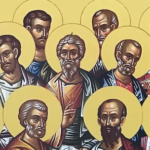 “Jesus summoned the Twelve and began to send them out two by two.”
“Jesus summoned the Twelve and began to send them out two by two.”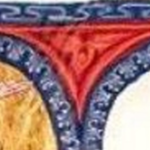 “A prophet is not without honor except in his native place and among his own kin and in his own house.”
“A prophet is not without honor except in his native place and among his own kin and in his own house.” “He took the child by the hand and said to her, ‘Talitha koum,’ which means, ‘Little girl, I say to you, arise!’”
“He took the child by the hand and said to her, ‘Talitha koum,’ which means, ‘Little girl, I say to you, arise!’”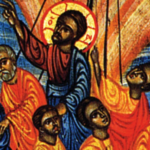 “Who then is this whom even wind and sea obey?”
“Who then is this whom even wind and sea obey?” “But once it is sown, it springs up and becomes the largest of plants and puts forth large branches, so that the birds of the sky can dwell in its shade.”
“But once it is sown, it springs up and becomes the largest of plants and puts forth large branches, so that the birds of the sky can dwell in its shade.” “Here are my mother and my brothers. For whoever does the will of God is my brother and sister and mother.”
“Here are my mother and my brothers. For whoever does the will of God is my brother and sister and mother.” “When Christ came as high priest … passing through the greater and more perfect tabernacle … he entered once for all into the sanctuary …”
“When Christ came as high priest … passing through the greater and more perfect tabernacle … he entered once for all into the sanctuary …” “Go, therefore, and make disciples of all nations, baptizing them in the name of the Father, and of the Son, and of the Holy Spirit.”
“Go, therefore, and make disciples of all nations, baptizing them in the name of the Father, and of the Son, and of the Holy Spirit.” “Receive the Holy Spirit. Whose sins you forgive are forgiven them, and whose sins you retain are retained”
“Receive the Holy Spirit. Whose sins you forgive are forgiven them, and whose sins you retain are retained”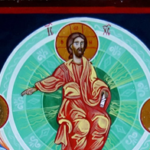 “So then the Lord Jesus, after he spoke to them, was taken up into heaven and took his seat at the right hand of God.”
“So then the Lord Jesus, after he spoke to them, was taken up into heaven and took his seat at the right hand of God.” “This is my commandment: love one another as I love you.”
“This is my commandment: love one another as I love you.”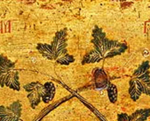 “I am the vine, you are the branches. Whoever remains in me and I in them will bear much fruit.”
“I am the vine, you are the branches. Whoever remains in me and I in them will bear much fruit.” “I am the good shepherd, and I know mine and mine know me …”
“I am the good shepherd, and I know mine and mine know me …” “Look at my hands and my feet, that it is I myself.”
“Look at my hands and my feet, that it is I myself.”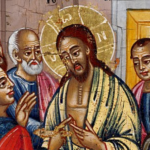 “’Have you come to believe because you have seen me? Blessed are those who have not seen and have believed.”
“’Have you come to believe because you have seen me? Blessed are those who have not seen and have believed.” “For they did not yet understand the Scripture that he had to rise from the dead.”
“For they did not yet understand the Scripture that he had to rise from the dead.” “He has been raised. He is not here.”
“He has been raised. He is not here.” “It is finished.”
“It is finished.”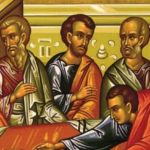 “I have given you a model to follow, so that as I have done for you, you should also do.”
“I have given you a model to follow, so that as I have done for you, you should also do.” Palm Sunday Scripture Readings God and humankind seem always to be at cross-purposes. God is forever reaching out to show himself to us, to tell us about himself, and to lift us up out of… Read more: What Are You Looking For?
Palm Sunday Scripture Readings God and humankind seem always to be at cross-purposes. God is forever reaching out to show himself to us, to tell us about himself, and to lift us up out of… Read more: What Are You Looking For? “The hour has come for the Son of Man to be glorified.”
“The hour has come for the Son of Man to be glorified.” “Just as Moses lifted up the serpent in the desert, so must the Son of Man be lifted up, so that everyone who believes in him may have eternal life.”
“Just as Moses lifted up the serpent in the desert, so must the Son of Man be lifted up, so that everyone who believes in him may have eternal life.” “Take these out of here, and stop making my Father’s house a marketplace.”
“Take these out of here, and stop making my Father’s house a marketplace.” “This is my beloved Son. Listen to him.”
“This is my beloved Son. Listen to him.” “He was among wild beasts, and the angels ministered to him.”
“He was among wild beasts, and the angels ministered to him.”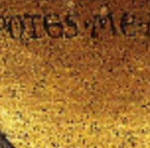 “‘I do will it. Be made clean.’ The leprosy left him immediately, and he was made clean.”
“‘I do will it. Be made clean.’ The leprosy left him immediately, and he was made clean.” “He approached, grasped her hand, and helped her up. Then the fever left her and she waited on them.”
“He approached, grasped her hand, and helped her up. Then the fever left her and she waited on them.” “I know who you are—the Holy One of God!”
“I know who you are—the Holy One of God!” “Come after me, and I will make you fishers of men.”
“Come after me, and I will make you fishers of men.”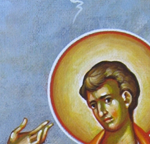 Second Sunday Scripture Readings Today, we begin to follow the ministry of Jesus—a ministry that commenced when his true identity was revealed at his baptism by John in the Jordan River. In a short while,… Read more: Steps to Discipleship
Second Sunday Scripture Readings Today, we begin to follow the ministry of Jesus—a ministry that commenced when his true identity was revealed at his baptism by John in the Jordan River. In a short while,… Read more: Steps to Discipleship “They were overjoyed at seeing the star, and on entering the house they saw the child with Mary his mother.”
“They were overjoyed at seeing the star, and on entering the house they saw the child with Mary his mother.” “And Mary kept all these things, reflecting on them in her heart.”
“And Mary kept all these things, reflecting on them in her heart.” “The child grew and became strong, filled with wisdom; and the favor of God was upon him.”
“The child grew and became strong, filled with wisdom; and the favor of God was upon him.” “And the Word became flesh and made his dwelling among us.”
“And the Word became flesh and made his dwelling among us.” “For today in the city of David a savior has been born for you who is Christ and Lord.”
“For today in the city of David a savior has been born for you who is Christ and Lord.”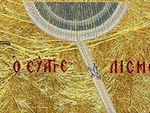 “Behold, I am the servant of the Lord, may it be done to me according to your word.”
“Behold, I am the servant of the Lord, may it be done to me according to your word.” “I baptize with water; but there is one among you whom you do not recognize, the one who is coming after me, whose sandal strap I am not worthy to untie.”
“I baptize with water; but there is one among you whom you do not recognize, the one who is coming after me, whose sandal strap I am not worthy to untie.” “John went throughout the whole region of the Jordan, proclaiming a baptism of repentance for the forgiveness of sins.”
“John went throughout the whole region of the Jordan, proclaiming a baptism of repentance for the forgiveness of sins.” “What I say to you, I say to all: ‘Watch!”
“What I say to you, I say to all: ‘Watch!” “When the Son of Man comes in his glory, and all the angels with him, he will sit upon his glorious throne.”
“When the Son of Man comes in his glory, and all the angels with him, he will sit upon his glorious throne.” “’Well done, my good and faithful servant. Since you were faithful in small matters, I will give you great responsibilities.’”
“’Well done, my good and faithful servant. Since you were faithful in small matters, I will give you great responsibilities.’”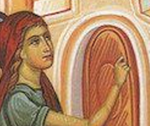 “‘Lord, Lord, open the door for us!’ But he said in reply, ‘Amen, I say to you, I do not know you.’”
“‘Lord, Lord, open the door for us!’ But he said in reply, ‘Amen, I say to you, I do not know you.’”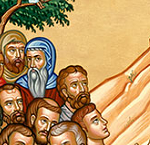 “Whoever exalts himself will be humbled; but whoever humbles himself will be exalted.”
“Whoever exalts himself will be humbled; but whoever humbles himself will be exalted.” “Blessed are the poor in spirit, for theirs is the Kingdom of heaven.”
“Blessed are the poor in spirit, for theirs is the Kingdom of heaven.” “Teacher, which commandment in the law is the greatest?”
“Teacher, which commandment in the law is the greatest?” “Then repay to Caesar what belongs to Caesar and to God what belongs to God.”
“Then repay to Caesar what belongs to Caesar and to God what belongs to God.”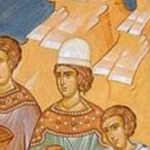 “Bind his hands and feet and cast him into the darkness outside.”
“Bind his hands and feet and cast him into the darkness outside.” “The stone that the builders rejected has become the cornerstone.”
“The stone that the builders rejected has become the cornerstone.” “…and every tongue confess that Jesus Christ is Lord, to the glory of God the Father.”
“…and every tongue confess that Jesus Christ is Lord, to the glory of God the Father.” “My friend, I am not cheating you. Did you not agree with me for the usual daily wage? Take what is yours and go.”
“My friend, I am not cheating you. Did you not agree with me for the usual daily wage? Take what is yours and go.”